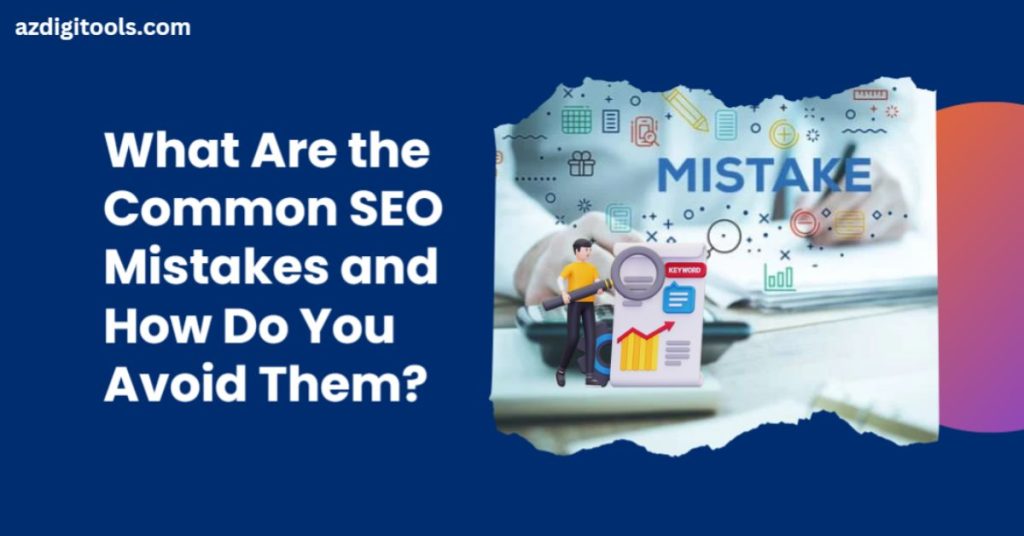
SEO is an ever-evolving field that demands businesses keep pace with changing search engine algorithms. Unfortunately, these changes sometimes result in mistakes that harm rather than help their search rankings.
An all too frequent mistake involves failing to optimize website content properly and keep up-to-date with new digital trends as they emerge.
7 Common SEO Mistakes
1. Keyword Stuffing and Irrelevant Keywords
One of the most frequent SEO mistakes is overstuffing content with keywords in an unnatural manner, something search engines consider unfavorable and which can negatively impact rankings.
To prevent this, it’s important to focus on writing natural-sounding text that addresses search intent instead of keywords; this will ensure your content remains relevant for those searching for it while helping maintain a healthy keyword density.
Avoid this mistake by employing a keyword research tool to identify the most frequently searched terms or phrases for your product or service. This will enable you to locate keywords that people are searching for and are more likely to convert into customers.
Be sure to use unique titles and headings that don’t overburden search engines with keywords. Search engines often consider titles and headings when ranking pages, providing an opportunity for you to add some pertinent terms that can increase rankings.
Your URL should also be short and reader-friendly, as this helps maintain its quality ranking status in search results.
Also Read: What is SEO and How it Can Transform Your Business?
2. Neglecting Mobile Optimization
Due to an increasing percentage of internet users accessing sites via mobile devices, neglecting mobile optimization is a serious SEO faux pas that could result in poor user experiences and lower search engine rankings for businesses – which in turn may make it more challenging for customers to locate and navigate their website.
Optimizing a mobile website requires not only responsive design but also optimizing it for speedy loading times. This includes compressing images, minifying CSS and JavaScript files, and making sure text is legible on smaller screens.
Furthermore, simple navigation menus should be utilized over complex layouts that make reading difficult on mobile devices. Maintaining and updating your SEO strategy on an ongoing basis is paramount, given how search engines evolve their algorithms.
By adhering to these tips, you can avoid common SEO blunders that could affect your search engine rankings negatively and focus on giving your audience valuable information and an enjoyable experience instead.
After all, SEO is not about search engines alone but about building long-term relationships and relationships between people and brands – not search engines alone!
3. Ignoring Technical SEO
Search engine optimization (SEO) is an integral component of any successful marketing strategy, but it takes more than on-page SEO alone to bring high-quality content directly to its intended target audience.
Technical SEO includes numerous behind-the-scenes factors like website speed, sitemaps, and canonical tags; neglecting these elements could negatively affect search engine rankings.
One of the most frequent missteps is neglecting keyword research, leading to your content being discovered by people outside your target audience. To avoid this issue, be sure to include up-to-date, relevant keywords in title tags, meta descriptions, and other on-page elements.
Avoiding these common SEO errors will ensure your digital marketing strategy stays on course, reaching its intended audiences more effectively.
Remember that SEO is an ongoing process; therefore, it’s vital that you periodically assess and implement solutions to stay ahead of competitors. Get in touch with New Path Digital now to discover more about our comprehensive SEO services that can elevate your online presence and propel long-term success!
4. Lack of Quality Content
Quality content creation should always come first. Low-grade posts reflect poorly on a brand, bore readers, and turn them off; additionally, Google may consider them irrelevant to users searching for similar topics.
One way to prevent this mistake is by creating evergreen content – content that provides value now and will keep giving back for years to come.
Furthermore, using authoritative sources like academic studies, professional journals, or government organizations as sources is another great way of high-quality writing that stays within Google’s quality rater guidelines.
Your page’s text-to-HTML ratio, the percentage of content that consists of plaintext rather than HTML code, should also be checked regularly to assess its impact on SEO and load times.
An optimal ratio ranges between 25-70%; if your ratio falls outside this threshold, ensure its relevancy by eliminating unnecessary HTML elements from your pages’ content.
5. Ignoring On-Page Optimization
On-page SEO is one of the aspects of your website you have the greatest control over, as it encompasses aspects like loading speed and mobile performance.
Failing to address these areas could lower your site rankings significantly, so on-page optimization must be reviewed frequently as search engines constantly adapt their algorithms and change algorithms; keeping abreast with trends and practices is paramount to being competitive online.
Lacking internal link optimization is another frequent oversight. Optimizing internal links is a great way to enhance user experience and show Google that your content is useful and pertinent, yet overdoing it with links might drive away visitors and force them out altogether.
Be careful that too much internal linking does not occur; otherwise, they might get annoyed and leave the website entirely.
6. Neglecting Backlink Quality
Search engine optimization (SEO) is an essential element of digital marketing strategies, helping websites improve their presence in SERPs and generate more visitors – leading to more traffic and business.
But SEO mistakes could compromise its performance, so beware! There may be numerous pitfalls on your path toward optimizing for search.
One of the major mistakes people make in SEO is failing to manage backlink quality properly. While building as many links as possible is necessary, making sure these are of high quality is also key, as this will prevent problems such as damaging your online reputation, restricting reach, or losing out on organic traffic opportunities.
Another is to prevent this mistake is by regularly auditing your link profile with trusted SEO tools. This allows you to identify and disavow toxic or spammy links that could negatively impact your SEO ranking and ensure that backlinks come from websites relevant to your niche; doing this helps you avoid being penalized by search engines for unnatural or spammy backlinks.
7. Not Analyzing and Adapting
Imagine embarking on a road trip without GPS navigation – while you might enjoy it and end up somewhere unexpected, without proper planning, you could end up lost and waste time and resources.
SEO works similarly: without regularly reviewing and tweaking your site for optimization purposes, you risk missing opportunities to expand and grow your business.
Mistakenly optimizing for keywords that are too generalized or irrelevant to your niche will lead to poor rankings and low-converting traffic, while using long-tail keywords may help increase rankings while drawing in more qualified leads.
Implementing structured data markup is also key, as this helps search engines understand your content better and display it more prominently in SERP results.
Failure to implement structured data markup could limit its visibility and lower SERP rankings for your website, potentially hurting its visibility and, thus, its SERP rankings.
Final Words for Common SEO Mistakes
As digital marketing continues to transform, businesses must stay aware of SEO practices to ensure their websites are optimized for search engine visibility and growth. By avoiding common blunders such as these, businesses can ensure their sites are properly optimized for search engine visibility and growth.
Keyword research is at the core of SEO, and an effective keyword strategy can make or break a website’s performance. Understanding your audience and which words or phrases they may use when searching can make the content hard for people to locate. Failing to do so could result in content that’s difficult for your target market to access.
Gaps in your content and keyword strategies may also lead to missed growth opportunities, so it’s essential that businesses monitor competitors’ strategies, identify any gaps, and address them immediately.
By defining audiences, optimizing mobile optimization, prioritizing SEO efforts, producing quality content creation, remaining adaptable, and remaining flexible, businesses can create a successful digital marketing strategy that will achieve long-term success and maximize online business opportunities.





